Insect and Pest Information
Check out more information about insects and pests at the UW-Madison Department of Entomology website.
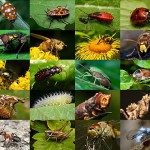 General Insect/Pest Links
General Insect/Pest Links
- Insect Diagnostic Lab-UW Department of Entomology
- UW-Department of Entomology
- Insect ID
- Bugguide.net
Common Wisconsin Insects/Pests |
Useful Resources |
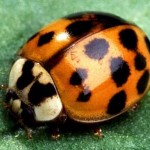 Asian Lady Beetle (Multicolored): Multicolored Asian lady beetles can be a nuisance as they congregate by the thousands on the sides of buildings, and if given the opportunity, move inside. Fortunately, multicolored Asian lady beetles are harmless, although repeated exposure has been reported to cause allergic reactions in a small number of people. Asian Lady Beetle (Multicolored): Multicolored Asian lady beetles can be a nuisance as they congregate by the thousands on the sides of buildings, and if given the opportunity, move inside. Fortunately, multicolored Asian lady beetles are harmless, although repeated exposure has been reported to cause allergic reactions in a small number of people. |
Multicolored Asian Lady Beetle-UWEX
|
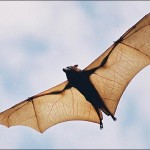 Bats: Few animals are as misunderstood as the bat. Much of the fear they elicit is unwarranted and based on misconceptions. For example, most bats are not rabid. Wisconsin bats do not suck blood; the vampire bat, which does, is not found within 1500 miles of Wisconsin. Bats: Few animals are as misunderstood as the bat. Much of the fear they elicit is unwarranted and based on misconceptions. For example, most bats are not rabid. Wisconsin bats do not suck blood; the vampire bat, which does, is not found within 1500 miles of Wisconsin. |
Bats: Information for Wisconsin Homeowners (.pdf) |
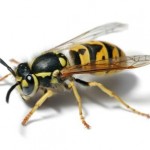 Bees/Wasps: Wasps and bees are beneficial insects, although they are generally considered to be pests because of their ability to sting. Wasps, in particular, can become a problem in autumn when they may disrupt many outdoor activities. People often mistakenly call all stinging insects “bees”. Bees/Wasps: Wasps and bees are beneficial insects, although they are generally considered to be pests because of their ability to sting. Wasps, in particular, can become a problem in autumn when they may disrupt many outdoor activities. People often mistakenly call all stinging insects “bees”. |
Bees and Wasps-MU Extension (.pdf) |
Box Elder Bugs: Boxelder bugs, a true bug from the insect family Rhopalidae, are commonly found both outside and inside homes during the fall through early spring. Boxelder bugs are about 3⁄4 of an inch long, and black in color with three red lines on the thorax and red lines on the wing margins. Bugs: Boxelder bugs, a true bug from the insect family Rhopalidae, are commonly found both outside and inside homes during the fall through early spring. Boxelder bugs are about 3⁄4 of an inch long, and black in color with three red lines on the thorax and red lines on the wing margins. |
Box Elder Bugs UWEX |
Creeping 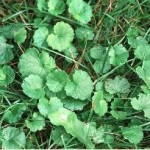 Charlie: Creeping Charlie (Glechoma hederacea) is an herbaceous perennial plant that spreads by seed and by creeping stems (called stolons) that grow along the ground. Charlie: Creeping Charlie (Glechoma hederacea) is an herbaceous perennial plant that spreads by seed and by creeping stems (called stolons) that grow along the ground. |
Creeping Charlie-UWEX |
Ear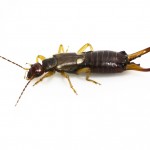 wig: Earwigs have large, pincers-like protrusions at the rear of the body, which give them an evil appearance, but they don’t harm people directly. Still, they can cause people problems by feeding on flowers and vegetables outdoors, by crawling into the home, and by congregating under well caps. wig: Earwigs have large, pincers-like protrusions at the rear of the body, which give them an evil appearance, but they don’t harm people directly. Still, they can cause people problems by feeding on flowers and vegetables outdoors, by crawling into the home, and by congregating under well caps. |
Controlling Earwigs UWEX (.pdf) |
Emerald Ash Borer (EAB):The Emerald Ash Borer (Agrilus planipennis) was discovered in Michigan in June 2002. It is a species of metallic wood boring beetle (Buprestidae) that attacks ash (Fraxinus), usually killing trees in one-three years. This beetles is now found in at least 10 states.
Protecting Your Tree from EAB
|
EAB- UW Department of Entomology
http://emeraldashborer.info/index.cfm
|
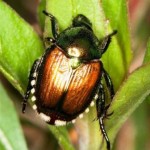 Japanese Beetle: The Japanese beetle, Popillia japonica, is considered the single most important turfgrass-infesting pest in the United States. Japanese Beetle: The Japanese beetle, Popillia japonica, is considered the single most important turfgrass-infesting pest in the United States. |
|
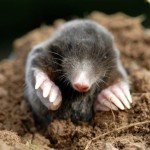 Moles: Although they are rarely seen, moles are common in Wisconsin. They make their presence known by the raised tunnels and mounds of soil they leave behind in lawns, gardens, fields, and pastures. Moles: Although they are rarely seen, moles are common in Wisconsin. They make their presence known by the raised tunnels and mounds of soil they leave behind in lawns, gardens, fields, and pastures. |
Effective Mole Control |
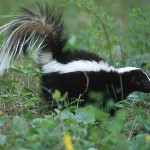 Skunks: Skunks are found throughout Wisconsin in agricultural areas and woodlands, as well as in towns and cities. For the most part, they are beneficial because they feed on insects and rodents. Occasionally, however, skunks can cause problems, particularly when they release their odorous musk near buildings. Skunks: Skunks are found throughout Wisconsin in agricultural areas and woodlands, as well as in towns and cities. For the most part, they are beneficial because they feed on insects and rodents. Occasionally, however, skunks can cause problems, particularly when they release their odorous musk near buildings. |
Skunks: How to deal with them (.pdf) |
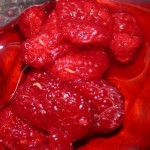 Spotted Winged Drosophila (SWD): is an exotic insect pest closely related to vinegar flies and has recently been discovered in Wisconsin. Recently (August 2012), several infestations have been detected on raspberries and strawberries in Southwest Wisconsin. Several unconfirmed reports have also come from the Northwest and North central parts of the state. Spotted Winged Drosophila (SWD): is an exotic insect pest closely related to vinegar flies and has recently been discovered in Wisconsin. Recently (August 2012), several infestations have been detected on raspberries and strawberries in Southwest Wisconsin. Several unconfirmed reports have also come from the Northwest and North central parts of the state. |
Spotted Wing Drosophila |
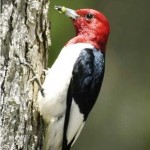 Woodpeckers: Woodpeckers are attractive, interesting visitors to bird feeders and yards. But they are not as harmless as they may appear. In fact, one of the most serious wildlife problems many homeowners face is a woodpecker hammering on the side of the house. Not only is the hammering annoying, but it can also cause considerable damage. Woodpeckers: Woodpeckers are attractive, interesting visitors to bird feeders and yards. But they are not as harmless as they may appear. In fact, one of the most serious wildlife problems many homeowners face is a woodpecker hammering on the side of the house. Not only is the hammering annoying, but it can also cause considerable damage. |
Controlling Woodpecker Damage (.pdf) |
Insect/Pest Highlights Archive
- Drugstore Beetle
- Firewood Insects
- Mealybug Fact Sheet
- Outdoor Hazards in Wisconsin
- Ticks; Biology of Ticks
- Spruce Gall Adelgids (.pdf, 2 pages)
- Brown Marmorated Stink Bug- Ohio State (.pdf, 2 pages)
- Brown Marmorated Stink Bug- Penn State
- Brown Marmorated Stink Bug- Rutgers
- Eastern Tent Caterpillar (.pdf, 2 pages)
- Rose Chafer (.pdf, 2 pages)
- Deciduous Tree Galls



